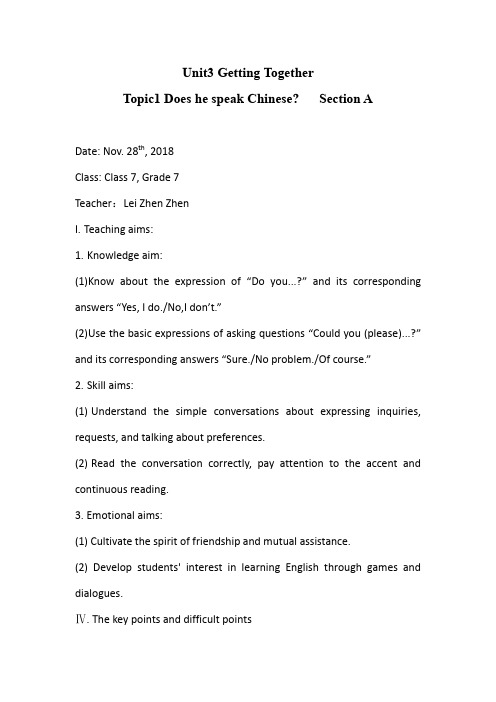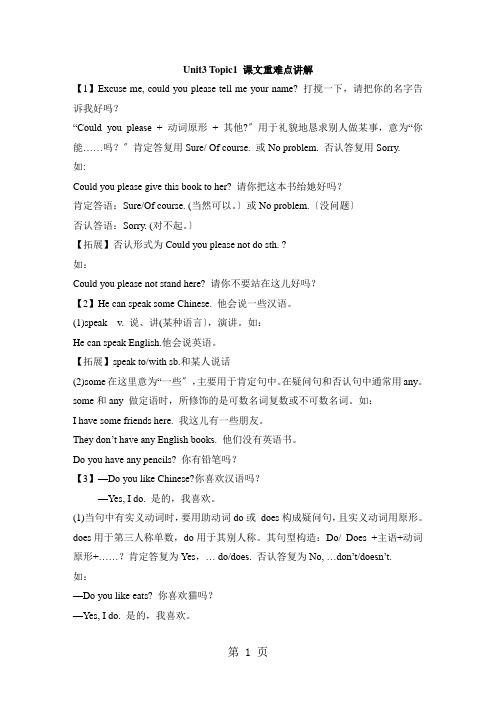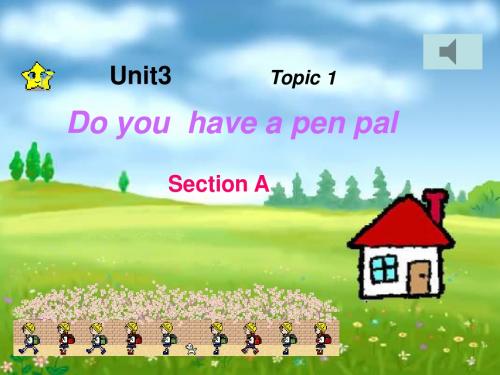仁爱英语七年级上册 Unit 3 Getting Together Topic 1 Does he speak ChineseSection D课件
仁爱科普版七年级上册Unit 3 Getting together Topic 1 教案

Unit3 Getting TogetherTopic1 Does he speak Chinese? Section ADate: Nov. 28th, 2018Class: Class 7, Grade 7Teacher:Lei Zhen ZhenI.Teaching aims:1.Knowledge aim:(1)Know about the expression of “Do you...?” and its corresponding answers “Yes, I do./No,I don’t.”(2)Use the basic expressions of asking questions “Could you (please)...?” and its corresponding answers “Sure./No problem./Of course.”2.Skill aims:(1)Understand the simple conversations about expressing inquiries, requests, and talking about preferences.(2)Read the conversation correctly, pay attention to the accent and continuous reading.3. Emotional aims:(1) Cultivate the spirit of friendship and mutual assistance.(2) Develop students' interest in learning English through games and dialogues.Ⅳ. The key points and difficult points1.Key points:(1)Words: could, tell, sure, some, with, often, well, problem(2)Expressions: ①---Excuse me, could you please tell me your name?---Sure. My name is Jane.②---Do you like Chinese?---Yes, I do. I like it very much.③---Could you help me with it?---No problem.2.Difficult points:Understand the simple conversations about expressing inquiries, requests, and talking about preferences.Ⅴ. Teaching proceduresStep 1: Warm up: listening to music.Step2 :Lead-in:(1)Play a guessing game: Students use the expression “Do you have...?” to guess who is the person in the box.(2)Teacher makes dialogues with students using expressions “Do you come from...?” “Do you like...?”. These are the practices of “Do you...?”Step 3:Presentation(1)Do listening exercise: Teacher introduces the text briefly. Students do the exercises according to the tape. Then, teacher checks the answer with students.(2)Role play: Based on the text, students practice the text by roles.Group competition: The competiton(reading the text) between group and group.(3)Explain some points of the text.Step 4:Practices(1)Based on the text, students should fill in the blanks.(2)Finish P55 1d: put the sentence in correct order.(3)Finish P56 2: listening to the tape and fill in the blanks.Step 5: Summary1.Do you+动词原形+...?Yes, I do./No, I don’t.2.Could you (please)+动词原形…?回答:Sure./Of course./No problem.Step 5:Homework(1)Recite 1a.(2)Finish the exercise book.(3)Preview Section BⅥ.Blackboard design:(1)Do you+动词原形+...?Yes, I do./No, I don’t.(2)Could you (please)+动词原形+...?回答:Sure./Of course./No problem./Sorry.。
仁爱版英语 七年级上册 Unit 3 Topic 1 课文及翻译

Unit 3 Getting Together一起去Topic 1 Does he speak Chinese ? 他讲中文吗?Section A1aExcuse me,could you please tell me your name?打扰一下,你能告诉我你的名字吗?Sure. My name is Jane.当然。
我的名字是简。
Do you come from America?你来自美国?No,I don’t. I come from Canada.不,我不是。
我来自加拿大。
Oh,I have a pen pal in Canada. He can speak some Chinese. Do you like Chinese?哦。
我有一个笔友在加拿大。
他会说一点中文。
你喜欢中文吗?Yes,I do. I like it very much. But my Chinese is not very good. Could you help me with it?是的。
我很喜欢中文。
但是我的中文不好。
你能帮我提高中文吗?No problem.没问题。
Section B1aWho is the letter from?这封信来自谁?It’s from my pen pai,Sam.来自我的笔友萨姆。
Does he speak Chinese?他讲中文吗?No,he doesn’t. He speaks English. But he knows a lot about China.不,他不讲。
他讲英文。
但是他很了解中国。
Does he live in England?他住在英格兰?Yes,he does.是的。
What does he say in the letter?他在信里说了什么?He wants to visit Beijing.他想浏览北京。
Oh,he can help you with your English.哦。
七年级英语上册《Unit 3 Getting Together》Topic 1 Does he sp

七年级英语上册《Unit 3 Getting Together》Topic 1 Does he speak Chines练习(含解析)(新版)仁爱版第一部分听力 (20分)Ⅰ.听句子,选择正确图片。
每个句子读两遍。
(5分)( )1.( )2.( )3.( )4.( )5.Ⅱ.听句子,选择正确答语。
每个句子读两遍。
(5分)( )6. A. Yes, I do. B. No problem. C. I like it a lot. ( )7. A. Thank you. B. What’s your name? C. Sure. I’m Linda.( )8. A. Yes, I like it very much. B. You are welcome. C. No, I am not.( )9. A. Yes, she is. B. Yes, he does. C. Yes, she does.( )10. A. She wants to visit Canada. B. She is my sister. C. Yes, she is.Ⅲ.听对话,判断下列句子的正(T)误(F)。
每组对话读两遍。
(5分)( )11. Linda lives in China.( )12. The boy’s name is David.( )13. Jim wants to visit Shanghai.( )14. The boy is Jim’s pen pal.( )15. The man likes English very much.Ⅳ.听短文,选择正确答案。
短文读两遍。
(5分)( )16. Mike is David’s ____.A. brotherB. pen palC. classmate ( )17. Mike comes from ____.A. EnglandB. AmericaC. China( )18. David’s pen pal is ____ years old.A. 12B. 13C. 14( )19. Mike wants to speak some ____.A. ChineseB. EnglishC. Japanese(日语) ( )20. ____ can help Mike with Chinese.A. Mike’s teacherB. David’s teacherC. David第二部分基础知识运用 (55分)Ⅰ.单项选择。
最新仁爱版初中英语七年级上册精品课件Unit 3 Getting together Topic 3SB

1. Review the lesson. 2. Write a report,
and report it in class next day.
福建省莆田市秀屿区湖东中学 刘志辉
假设某同学邀请几 个同学去家中吃饭。以 自备的有关食物的图片 或幻灯片上展示的食物 为谈话内容,几人一组 进行表演。
Help yourself; would like; yes, please/no, thank you; what about; …please; …for me; want; like…
Rabbit: __C_____________________
Monkey: Let me see. Mm ...
Rabbit: __A_____________________
Monkey: No, thanks.
Rabbit: __E_____________________
Monkey: Bananas. Well, I’d like seven bananas.
Rabbit: __B_____________________
Monkey: Banana juice, please.
Rabbit: ___D____________________
A: May I take your order? B: Let me see… A: Would you like …? B: Yes, … A: …something to drink? B: …
Match after 1a.
(录音P73-1a)
பைடு நூலகம்
Breakfast
Lunch
Dinner
Name
Item Food Drink Food Drink
仁爱版英语七年级上册 Unit3 Getting Together Topic1 Does he s

Unit3 Topic1 课文重难点讲解【1】Excuse me, could you please tell me your name? 打搅一下,请把你的名字告诉我好吗?“Could you please + 动词原形+ 其他?〞用于礼貌地恳求别人做某事,意为“你能……吗?〞肯定答复用Sure/ Of course. 或No problem. 否认答复用Sorry.如:Could you please give this book to her? 请你把这本书绐她好吗?肯定答语:Sure/Of course. (当然可以。
〕或No problem.〔没问题〕否认答语:Sorry. (对不起。
〕【拓展】否认形式为Could you please not do sth. ?如:Could you please not stand here? 请你不要站在这儿好吗?【2】He can speak some Chinese. 他会说一些汉语。
(1)speak v. 说、讲(某种语言〕,演讲。
如:He can speak English.他会说英语。
【拓展】speak to/with sb.和某人说话(2)some在这里意为“一些〞,主要用于肯定句中。
在疑问句和否认句中通常用any。
some和any 做定语时,所修饰的是可数名词复数或不可数名词。
如:I have some friends here. 我这儿有一些朋友。
They don’t have any English books. 他们没有英语书。
Do you have any pencils? 你有铅笔吗?【3】—Do you like Chinese?你喜欢汉语吗?—Yes, I do. 是的,我喜欢。
(1)当句中有实义动词时,要用助动词do或does构成疑问句,且实义动词用原形。
does用于第三人称单数,do用于其别人称。
其句型构造:Do/ Does +主语+动词原形+……?肯定答复为Yes,… do/does. 否认答复为No, …don’t/doesn’t.如:—Do you like eats? 你喜欢猫吗?—Yes, I do. 是的,我喜欢。
仁爱版七上《Uint 3 Getting Together Topic 1》ppt课件

That’s all for today.
Goodbye,everyone.
听录音并选择正确答案
1)Where does Jane come from? A. Japan. B. Canada.
C. China.
(2) Does Jane speak English? A. No, she doesn’t. B. Yes, she does. C. We don’t know. (3) Whose Chinese is poor? A. Jane’s. B. The boy’s. C. Maria’s.
课文讲解
• 1. Excuse me,could you please tell me your name ? Could 作情态动词,表示”可以”,”可能”,是can的 委婉说法.常用句型could you (please)+动词原形 ……?译成”你能……吗?” 肯定回答:sure或no problem否定回答:sorry.如: Could you please give the letter to Jane? 你能把这封信给简吗? tell后常跟双宾语结构,tell sb.sth.告诉某人某事.如: Tell me a story.给我讲个故事吧.
根据1a内容填空
The girl’s name is Jane. She comes Canada speakS from _______. She ______ English. Jane likes Chinese very much, but her Chinese is_______ . poor Li Xiang can help her________ with her Chinese.
听录音并选择正确答案
广东省仁爱版七年级英语上册《Unit 3 Getting Togethe

11. says, likes our school very much/ a lot 12. doesn’t know my mother’s name
// doesn’t know the name of my mother 13. can help each other 14. doesn’t have a pet at home
Keys to Unit 3 To15 BBBCC 21-25 BCBAD 31-35 BBCCA
6—10 BAABC 16—20 DBCBA 26—30 ADCB/DB 36—40 CBCCD
二、 1. my, mine 3. your, mine 5. Our, yours 7. yours 9. Its, its
五、 1. pet 2. its 3. has 4. likes 5. home 6. English 7. with 8. But 9. all 10. poor
11. we, our 13. his, His 15. He, him
2. hers, her 4. He, His, his 6. hers 8. them 10. they, them, their 12. She, her, She 14. We, us
三、 1. poor 2. pet 3. speaks 4. lives 5. visit 6. problems 7. tell 8. Chinese 9. wants 10. study
四、 1. tells me 2. with a long nose 3. many poor people, help them 4. Do you like dogs? No, I don’t. 5. Could you please tell me her age? 6. Are they from Cuba? Yes, they are. / Do they come from Cuba? Yes, they do. 7. can speak some/a little Chinese 8. is very poor, often helps me with it 9. wants an apple
- 1、下载文档前请自行甄别文档内容的完整性,平台不提供额外的编辑、内容补充、找答案等附加服务。
- 2、"仅部分预览"的文档,不可在线预览部分如存在完整性等问题,可反馈申请退款(可完整预览的文档不适用该条件!)。
- 3、如文档侵犯您的权益,请联系客服反馈,我们会尽快为您处理(人工客服工作时间:9:00-18:30)。
B
D
C
A
• do/does开头的一般疑问句。 (1)你经常去购物吗? (2)你在这有好朋友吗? (3)你的朋友喜欢英语吗? (4)她讲英语吗? (5)他帮助你学汉语吗?
He wants to visit the Great Wall. Do you want a pen pal?
Yes, I do. / No, I don’t. Does he speak Chinese?
主格定把主语作,宾格作宾不会错。
1. —Could you please+动词原形? 你能......吗? — Sure. / Of course. / No problem. 能。 Sorry. 不能。 2. help sb. with sth. help sb. (to) do sth. 3. speak 讲、说+(某种语言) He can speak English .
A: Excuse me, could (could/do) you
please tell me your name?
B: Sure. My name is Jane.
A:
Could you help me with it?
B: No
(No/Not) problem.
A: Does he like (like/likes) Chinese?
1. He wants (want/wants) to Beijing.
2. She likes (like/likes) Chinese very much. 3. (Does/Do) Does he speak Chinese? Yes, he does(does/do). / No, he doesn’t. 4. (Does/Do) Does Lucy speak Chinese? Yes, she does. / No, he doesn’t (don’t/doesn’t).
is the teacher in red.
(we/us, she/her)
A: We her
want to give this letter to
Miss Wang. But we don’t know
. Could you help
us
?
பைடு நூலகம்
Subject pronoun
I
Object pronoun
A. I like English very much. I have many English books. I often read them.
B. I am an actor. I often visit America, Canada and England. I meet a lot of people. Some of them have blond hair and blue eyes. C. Every day I read many letters from my pen pals. These letters are in English. D. I have many friends. They come from America. Some of them can speak Chinese well. They often help me with my English.
me you her it you
We’re in the same class. I like it very much. He lives in England. She is a doctor. … so I often help her. Are they your friends?
he
it
Does he speak Chinese?
No, he doesn’t. He speaks English.
What does he want to do?
He wants to visit Beijing.
He likes Chinese very much.
Questions and answers with do/does:
B: Yes, he likes it very much/a lot/a little.
No, he doesn’t like it at all.
like ... very much/a lot
非常喜欢
like ... a little (not) like ... very much
有点喜欢/不是很喜欢
A: Excuse me , are you from Canada?
(I/me, he/him)
A: Is Mr. Brown your English teacher?
B: Yes, I am.
B: Yes, he is. We
like him very much.
B: No problem. She
(not) like ... at all
一点不喜欢
1. They like English very much.
2. He likes Chinese a little.
3. She doesn’t like it at all.
Read the following sentences and match them with pictures on the next page.
☆ Do you come from the USA? Yes, I do. / No, I don’t. ☆ Does he speak Chinese? Yes, he does. / No, he doesn’t. ☆ Does Jane like China? Yes, she does. / No, she doesn’t.
we
you
Do you like them?
Please help us find him.
they
人 称
第一人称
第二人称
第三人称
分类
主格
单数 复数 单数 复数
单数
复数
I
we
you
you
he she
it
they
宾格
me
us
you
you him her
it
them
用法口诀: 人称代词分两格,主格宾格来分说;
